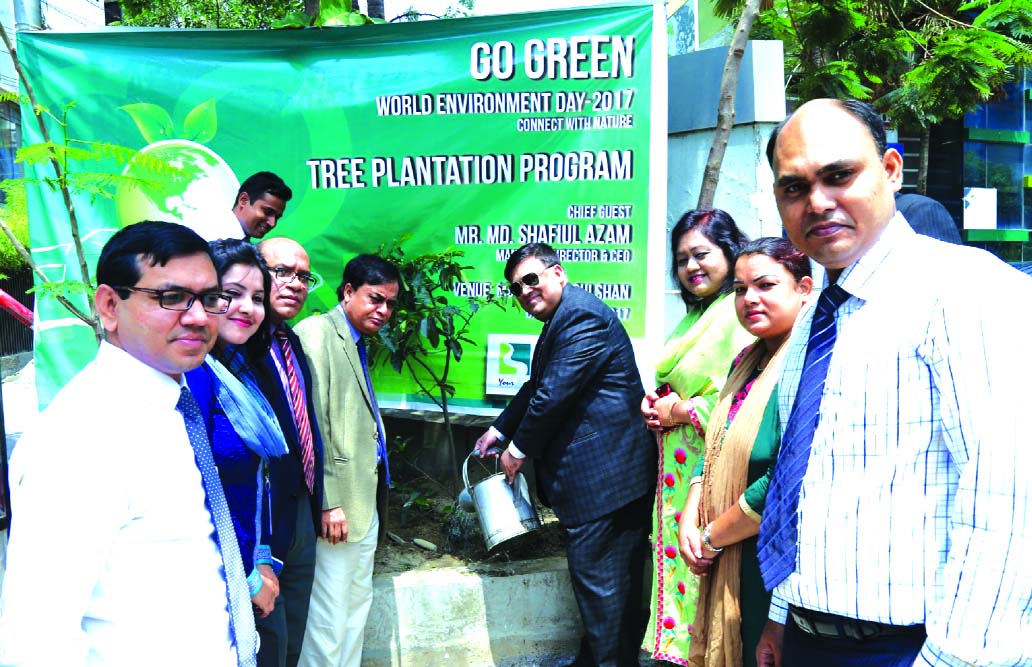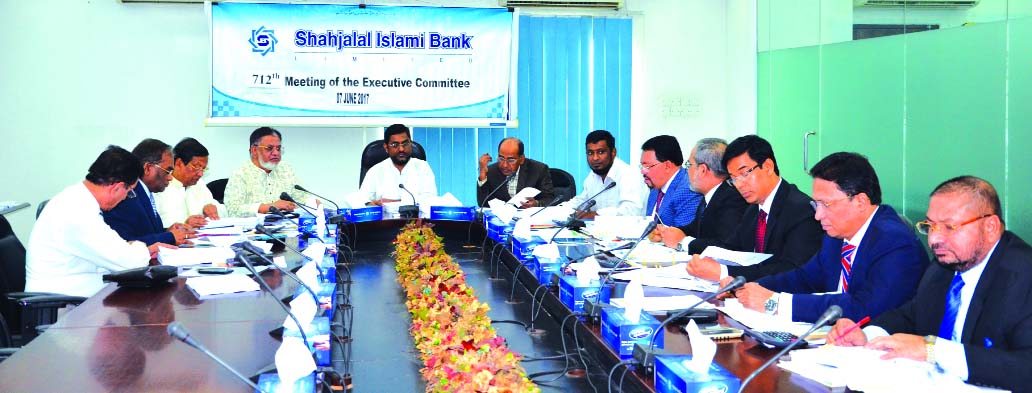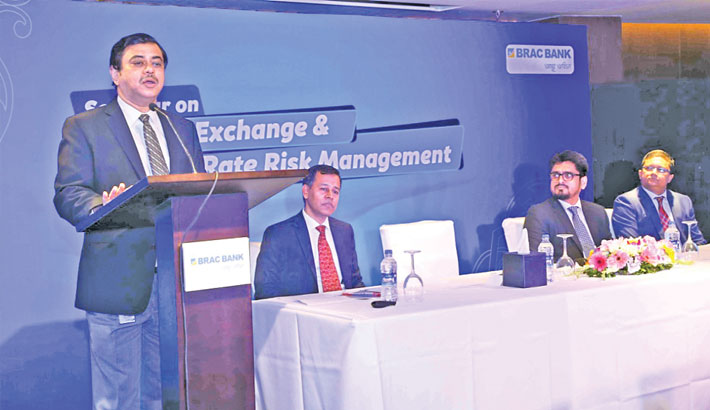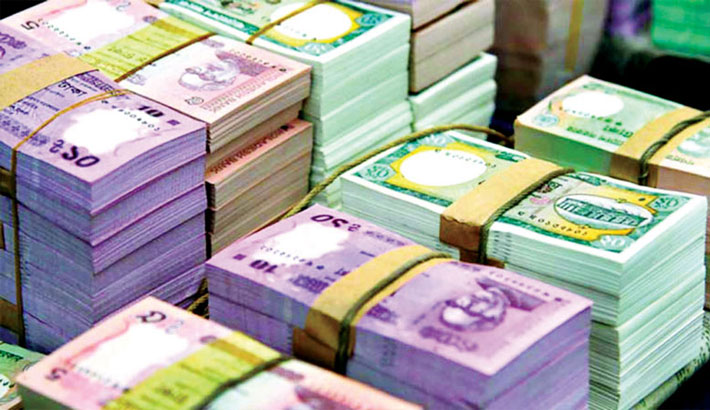Banking
Md. Shafiul Azam, Managing Director of Modhumoti Bank Limited, inaugurating a "Tree Plantation Programme" on the occasion of World Environment Day-2017 at Modhumoti Gulshan Branch premises on Tuesday. SK Talibur Rahman, SEVP & Chief Risk Officer, Naim Md.
 Md. Shafiul Azam, Managing Director of Modhumoti Bank Limited, inaugurating a \"Tree Plantation Programme\" on the occasion of World Environment Day-2017 at Modhumoti Gulshan Branch premises on Tuesday. SK Talibur Rahman, SEVP & Chief Risk Officer, Naim
Md. Shafiul Azam, Managing Director of Modhumoti Bank Limited, inaugurating a \"Tree Plantation Programme\" on the occasion of World Environment Day-2017 at Modhumoti Gulshan Branch premises on Tuesday. SK Talibur Rahman, SEVP & Chief Risk Officer, Naim
Md. Sanaullah Shahid, EC Chairman of Shahjalal Islami Bank Limited presiding over the 712th meeting at the bank head office in the city recently. Farman R Chowdhury, Managing Director, Akkas Uddin Mollah, Anwer Hossain Khan, Khandaker Sakib Ahmed, Directo
 Md. Sanaullah Shahid, EC Chairman of Shahjalal Islami Bank Limited presiding over the 712th meeting at the bank head office in the city recently. Farman R Chowdhury, Managing Director, Akkas Uddin Mollah, Anwer Hossain Khan, Khandaker Sakib Ahmed, Directo
Md. Sanaullah Shahid, EC Chairman of Shahjalal Islami Bank Limited presiding over the 712th meeting at the bank head office in the city recently. Farman R Chowdhury, Managing Director, Akkas Uddin Mollah, Anwer Hossain Khan, Khandaker Sakib Ahmed, Directo
news:new nation/10-jun-2017
BRAC Bank holds seminar
 BRAC Bank Managing Director and CEO Selim RF Hussain speaks at a seminar on ‘Foreign Exchange and Interest Rate Risk Management’ at a hotel in Dhaka on Thursday.
BRAC Bank Managing Director and CEO Selim RF Hussain speaks at a seminar on ‘Foreign Exchange and Interest Rate Risk Management’ at a hotel in Dhaka on Thursday.
BRAC Bank organised a seminar on ‘Foreign Exchange and Interest Rate Risk Management’ for its corporate customers on Thursday.
Selim RF Hussain, Managing Director and CEO, BRAC Bank, inaugurated the seminar at a hotel in Dhaka, said a press release. Chowdhury Akhtar Asif, Deputy Managing Director and CRO, Tareq Refat Ullah Khan, Head of Corporate Banking, Shaheen Iqbal, Head of Treasury and Financial Institutions, BRAC Bank, were present.
The seminar discussed various matters relating to volatility in foreign exchange and foreign currency interest rates.
news:daily sun/9-jun-2017Vigilance intensifies against fake notes ahead of Eid

Intelligence vigilance has been strengthened across the country aimed at stopping circulation of fake notes ahead of the Eid-ul-Fitr, reports BSS.
Besides, Bangladesh Bank issued a circular on Wednesday, asking 56 commercial banks to be cautious against any attempt to circulate fake notes during the month of Ramadan.
All the commercial banks have been instructed to take necessary measures, including screening videos prepared on security features of bank notes in all divisional cities for at least one hour after evening to make people aware to prevent spread of fake notes during the month of Ramadan.
Talking to BSS on Thursday, Additional Inspector General (admin) of Police Md. Mukhlesur Rahman said, “We have instructed all concerned to intensify intelligence vigilance at three tiers to stop production, circulation and use of fake notes ahead of the Eid.”
“Law enforcers have been asked to conduct special drives after identifying the places where the counterfeit bank notes are being produced and used,” he said, adding that they are now taking more measures to stop the use of fake notes.
Intelligence watch has been intensified at different places, particularly at the shopping malls and bank areas as the currency forgers usually increase production of counterfeit notes targeting the Eid.
In addition to the shopping malls and bank areas, places around different slums are also under watch because the currency forgers prefer illiterate slum dwellers for circulating the fake notes.
Over 30 crime syndicates have been involved in producing fake notes of different currencies, especially US dollars, Euro, Pound, Saudi Riyal and Taka, a police official said.
“Criminals usually choose the low grade areas like slums located at different parts of Dhaka, Narayanganj, Savar, Tongi, Gazipur, Munsiganj and Keraniganj for running the illegal business,” he said.
“The criminals spend around Taka 150 for producing a note of Taka 500 as a real note of Taka 100 and chemicals of Taka 50 are needed to convert it into a Taka 500 note,” he said, quoting some of the criminals earlier arrested and interrogated by law enforcers.
“The fake note traders first sell a fake note of Taka 500 at Taka 250 to the whole sellers who sell it to the third party at Taka 350 who later sell it to the fourth party at Taka 400,” he said.
“Though we have lodged scores of cases against the arrested people with different police stations, they usually get bail from the court after a period as the sections of law under which the cases were lodged are bailable and later they get involved again in the same business,” he added.
news:daily sun/9-jun-2017CAB wants govt to withdraw excise duty on bank balance
Also seeks VAT waiver on utilities, petroleum products
The Consumers Association of Bangladesh (CAB) has proposed the government should exempt electricity, gas, water and petroleum products such as diesel and kerosene from value added tax (VAT) and withdraw excise duty on bank balance for protecting the interests of consumers.
Consumers want assurance that the prices of those products would not go up after implementation of the new VAT act, the CAB leaders said.
"We want relief, not prosperity. After placing the proposed budget, both consumers and businesses are in discomfort," CAB president Golam Rahman said on Thursday.
CAB apprehends that the prices of products would go up as 15 per cent uniform VAT rate would be imposed on all products, he told a workshop on benefits under new VAT and Supplementary Duty Act-2012 organised by the National Board of Revenue (NBR) at the city's Institution of Diploma Engineers Bangladesh (IDEB).
CAB hopes that the government would bring necessary amendments to the proposed budget and present a public-friendly budget, he added.
The real value of bank deposits has declined if bank interest rate of 4.0-5.0 per cent and inflation rate of 5.0-6.0 per cent are taken into consideration, the CAB president said.
Depositors will be affected if they are forced to pay higher excise duty, he said. "We have doubt where 15 per cent VAT is properly deposited in the public exchequer or not."
The government has exempted essential commodities from VAT but included a number of unnecessary products in the list of VAT-exempted products, he said.
Mr Rahman added: "With the inflated numbers, the government's credibility and acceptance is under question."
The proposed budget raised SD on tea, toothpaste, soap and some other products that are also essential for daily life, he said.
Also, VAT on cement, rod and other construction materials increased in the proposed budget that would push up the cost of building residences, he said.
The government proposed increasing tax on a kind of tobacco products which should be raised for all kinds of tobacco products, considering its health hazards, he added.
He also said the government should focus on direct tax collection instead of collection of indirect tax.
The CAB president urged the government to supply at least 50,000 to 0.1 million Electronic Cash Register (ECR) machines to the sales centres to ensure proper collection of VAT.
On excise duty, Mr Rahman said it is not the right way to impose heavy tax burden on bank depositors while the government should take stern action against the vested quarters and board of directors who are looting the banks.
He said the government should lay emphasis on large power projects instead of rental power plants.
DR M Shamsul Alam, adviser of CAB, said the wholesale rate of electricity is Tk 6 to Tk 6.5 per unit including subsidy and the government is imposing VAT on subsidy.
"Exempt VAT on gas, electricity, water and energy products for expediting the national growth," he said, adding that the new VAT law may result in increase in the prices of products as the government has less control on businesses.
How the VAT collection rule would be made effective in a market where the prices of products and services depend on bargaining, he added.
Dr Alam said the complex VAT law should be made clear to the businesses.
"On electricity, consumers are paying 5.0 per cent VAT which has been increased to 15 per cent in the proposed budget. The consumers will have to bear the brunt of that hike," he added.
He said gas of international oil companies is exempted from SD and VAT but the Bangladesh Energy Regulatory Commission (BERC) fixes the gas price by adding tax including local and IOC's gas.
VAT policy member Jahangir Hossain said gas produced by IOCs is exempt from VAT and SD to reduce the amount of subsidy as the government purchases gas at higher rate than that of selling price.
He said electricity price would not be increased if the power division claims rebate under the new VAT law.
A team of the NBR is working on the electricity price to ensure a win-win situation for both consumers and the government, he added.
Industrial units have to reduce the system loss to boost up its efficiency and productivity, he added.
About excise duty on bank accounts, he said the duty would be deducted once a year if the balance exceeds Tk 0.01 million any time round the year.
Mr Hossain ruled out the possibility of increasing the prices of products except MS rod. NBR chairman Md Nojibur Rahman said the government offered a widespread VAT exemption on the products which are under 5.0 per cent and 12 per cent VAT net in neighbouring country India.
Exemption has been given considering four issues including protection of local industries, boosting export, helping industries competitive in international market and employment generation.
The list of essential products that are exempt from VAT should be counted rather than focusing on the number of goods, he added.
VAT member and project director of Vat Online Project (VOP) Rezaul Hassan said the SD protection for local industries, essential consumers' goods, zero-duty facility for some products at import stage has been kept unchanged in the proposed budget.
"There is misleading information that VAT at a rate of 15 per cent would be imposed on all sectors. With the VAT refund on inputs, the rate would be reduced to 3.0 per cent," he added.
The government will consider if there is any products or services left out from VAT exemption causing public sufferings, he said.



